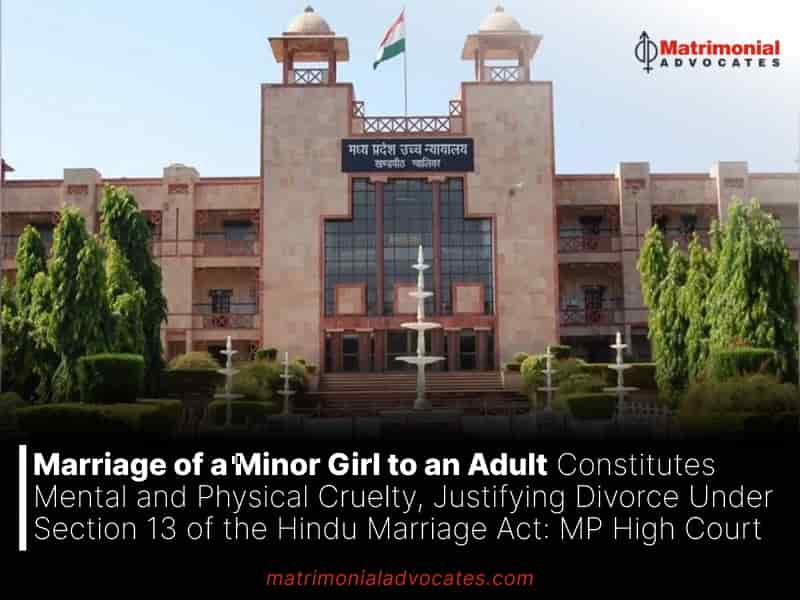
The Court declared the marriage null and void on the grounds of mental and physical cruelty, as the wife, being a minor, was not prepared to fulfill marital obligations.
Madhya Pradesh High Court: In an appeal filed by the appellant (wife) under Section 28 of the Hindu Marriage Act, 1955, challenging the District Judge’s decision to dismiss her suit seeking a decree to declare her marriage void or voidable, a Division Bench consisting of Justices Vivek Rusia and Binod Kumar Dwivedi held that the marriage of a minor girl to an adult can cause mental and physical cruelty, as she was not prepared to fulfill marital obligations. This, they ruled, provides an additional ground for divorce under Section 13 of the Act, and consequently, the Court declared the marriage between the appellant and the respondent null and void.
The appellant’s marriage to the respondent (husband) was solemnized on 21-05-2009, in accordance with Hindu customs. At the time of the marriage, the appellant was 15 years old. Although she lived with her husband after the marriage, it was never consummated. Later, she discovered that the respondent was partially blind, which led her to seek a decree of nullity. The appellant subsequently filed a suit before the District Court in Ujjain, seeking to nullify the marriage under Sections 11 and 12 of the Hindu Marriage Act, 1955, on the grounds that the respondent’s blindness, a condition concealed from her, made the marriage voidable.
The District Court dismissed the appellant’s suit, ruling that the marriage could not be declared void or voidable under Sections 11 and 12 of the Act, as the breach of Clause (iii) of Section 5 (related to age) was not covered by these provisions. Dissatisfied with this ruling, the appellant filed the present appeal challenging the decision.
The appellant argued that the marriage was neither consummated nor valid, as it violated the age requirements under Section 5 of the Act, and thus should be declared void or voidable. She also cited Section 3 of the Prohibition of Child Marriage Act, 2006, which renders child marriages voidable at the option of the minor contracting party. Furthermore, she claimed that the respondent’s blindness had been fraudulently concealed. In support of her arguments, she referenced precedents such as Independent Thought v. Union of India (2017) 10 SCC 800 and T. Sivakumar v. Inspector of Police, Thiruvallur Town Police Station 2011 SCC OnLine Mad 1722, emphasizing that while child marriages are voidable, they are not automatically void. The respondent, on the other hand, denied any knowledge of the appellant’s age and contended that she had left to live with her parents and was no longer interested in continuing the marriage.
The Court acknowledged that the marriage was performed when the appellant was a minor and that the respondent was blind in one eye. It observed that under Section 3 of the Prohibition of Child Marriage Act, a child marriage can be voidable at the option of the minor contracting party. The Court further noted that the lower court had erred by focusing solely on the Hindu Marriage Act without considering the provisions of the Prohibition of Child Marriage Act.
The Court concluded that the appellant, as a minor, should have sought annulment under the Prohibition of Child Marriage Act rather than relying solely on Sections 11 and 12 of the Hindu Marriage Act, due to a lack of knowledge about the appropriate legal provisions. Additionally, the Court emphasized that a marriage involving a minor can lead to mental and physical cruelty, as the minor may not be ready to fulfill marital obligations, thereby providing another ground for divorce under Section 13 of the Act.
“It is a case of cruelty also, the marriage of a minor girl with a major male will cause mental as well as physical cruelty as she was not ready to perform the marital obligations, therefore, under Section 13 of HMA also she could have claimed the divorce from the husband / respondent.”
The Court affirmed that under the Prohibition of Child Marriage Act, child marriages are voidable, and that cruelty, including the mental and physical suffering caused by marrying a minor unprepared to fulfill marital obligations, can be grounds for divorce under Section 13 of the Act. The Court set aside the judgment of the Additional District Judge and declared the marriage between the appellant and the respondent null and void.





